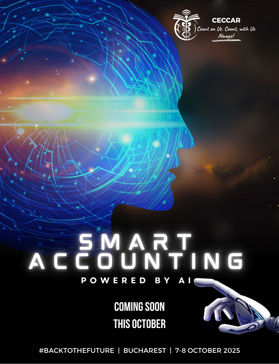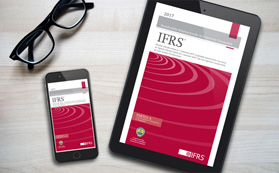Accounting for the Future: Innovation, Technology and Sustainability in the Digital Age. Interview with Sarah Ghosh, president of the largest professional body for management accountants
Numărul 2, 17-23 ian. 2024 » Opinii
CECCAR Business Magazine (CBM): Digital transformation is reshaping the accounting profession. What is the key to innovation in accounting practices and what should accounting professionals do to be fit for future?
Sarah Ghosh (SG): I am very pleased you started with this question, as it is the top issue facing the profession. It also links nicely to why AICPA & CIMA want to work closely with CECCAR to support the profession in Romania.
We are seeing emerging technologies, like artificial intelligence, robotic process automation, and machine learning are increasing the profession’s efficiency, enabling us to drive more value and have more purposeful jobs. I know this from experience. My own background is in computer science, and I’ve worked on IT projects with major publicly listed clients, developing operational and financial systems across the motor and banking industries. I can tell you with confidence that we are on the cusp of a digital revolution which is going to change our roles and the profession beyond recognition.
As the structure of our profession evolves, we are presented with both new opportunities and threats. If we seize the opportunity to adapt and upskill, we can dedicate our time to activities that drive performance, deliver value, and bring new strategic insights to the top decision-making process. Continued innovation is what ensures not only the long-term resilience of the profession but also the organisations we serve.
However, the flip side of these opportunities is that those of us who do not adapt to digital transformation risk being left behind. To remain successful, we as accounting professionals must disrupt ourselves and embrace technology to our advantage. We must also have a mindset to learn, unlearn and relearn. The profession too needs to work even harder to develop top talent and to equip ourselves with an innovative and life-long-learning spirit and drive to leverage technology to improve the work that we do.
Whilst this may feel overwhelming to some, I am very excited about the opportunities for the profession to seize the future.
CBM: What specific strategies are AICPA & CIMA implementing to ensure its members are proficient in advanced digital tools and technologies like AI, blockchain, and data analytics?
SG: At AICPA & CIMA we are always looking to expand our portfolio of tools and resources and thought leadership to help accounting and finance professionals make the most of this digital revolution.
We have just completed and released the first findings of our Future of Finance 2.0 research programme, including a paper on The digital journey of finance, which explores the future state of the finance profession and its broader ecosystem, defining essential skills, competencies, and knowledge. These findings underpin the development of our qualifications, thought leadership and learning resources.
Last year, we released the second edition of our Global Management Accounting Principles (GMAP) to reflect the new era of digital acceleration, as well as environmental, social, and governance aspects (ESG). Built on over a decade of practice analysis, the GMAP are the blueprint for management accounting theory and practice.
We also updated our member CPD Transformative Skills Pack to help them drive business performance, guide strategic decision-making, and accelerate their careers. This included new content to support the Digital Mindset and built on what we have labelled the ABCD fundamentals: AI, Blockchain, Cybersecurity and Data Analytics.
I am delighted that AICPA & CIMA are working closing with CECCAR to explore how best to make these resources available as Continuing Professional Development (CPD) opportunities for accounting and finance professionals in Romania, and to build on the Memorandum of Understanding (MoU) we have recently signed to look at future opportunities.
CBM: In light of increasing focus on sustainability, what are AICPA & CIMA's key directions for action to increase awareness among accounting professionals of the importance of integrating environmental, social and governance (ESG) issues into their work?
SG: The role of the accounting and finance profession is expanding to support the changes being brought about by Environment, Governance and Societal (ESG) related issues impacting economies, businesses and individuals.
It is therefore becoming critical for accounting and finance professionals to gain a solid understanding of how sustainability impacts clients and organisations, including meeting corporate reporting, audit, assurance and compliance requirements. For that reason, providing tools and resources for broad upskilling on sustainability and ESG matters is one of AICPA & CIMA’s highest priorities.
In response to this, AICPA & CIMA is striving to support members every step of the way empowering them with knowledge and opportunities to become leaders in ESG and to contribute to a more sustainable, inclusive, and resilient future.
To help realise these goals, AICPA & CIMA have co-developed a joint executive management programme on ESG and Sustainable Financial Strategy with the globally renowned University of Oxford’s Saïd Business School. It will equip finance professionals with the tools and knowledge to make businesses more sustainable. It launched in September 2023 and will run quarterly.
In partnership with IFRS, AICPA & CIMA offer our members the opportunity to complete the IFRS Foundation’s Fundamentals of Sustainability Accounting (FSA) Credential. The programme is designed to help accounting and finance professionals to understand the link between financially-material sustainability information and a company’s ability to create value.
We also launched a Fundamentals of ESG Certificate to help accounting and finance professionals embrace ESG. The programme offers a first step in the learning journey for the high-growth area of sustainability reporting and assurance and provides an overview of the factors shaping each element of the E, the S and the G, as well as the developments which led to the launch of the ISSB at COP26.
Beyond this we are running events, providing thought leadership insights, including working with IFAC to publish our yearly “State of Play in Sustainability Assurance” benchmarking study and publishing topical reports, such as the “Accounting for” brief series, which includes the Accounting for the Sustainable Development Goals, Accounting for Carbon, Accounting for Nature, Accounting for Climate Resilience and a Sustainability & Business Toolkit which includes free resources and tools to help organisations navigate the sustainability landscape.
As we continue through 2024, we will be making more resource, reports and courses available to help support members embrace the issues and opportunities ESG presents to the profession.
CBM: Very often we talk about the digital revolution and the increasing complexity of financial transactions. What do you see as the role of forensic accounting in ensuring economic security in this context?
SG: I know that trust and confidence in capital markets is underpinned by the work of the accounting and finance profession. It is therefore natural that as the business environment becomes more complex, but connected, that forensic accounting is becoming an increasingly important specialism.
It is a fact that as digital technologies transform the business landscape and businesses engage in more complex financial transactions, often involving multiple parties and complex financial instruments, they can become more prone to fraud and financial mismanagement. Forensic accountants are the specialist experts who uncover this type of malpractice and act as an important safeguard.
The need for their skills is also being driven by changes in the regulatory environment. Regulators are increasingly focused on preventing financial fraud and enforcing anti-money laundering (AML) regulations. Forensic accountants play a key role in helping organisations comply with these regulations and ensuring that they are not engaging in any illegal or unethical financial activities. But whether someone specialises in forensic accountancy or not, an auditor, or any other finance professional, familiarity with financial red flags and internal control systems is indispensable.
AICPA and CIMA members know that deliberate unethical activity isn’t limited to an organisation’s finance team and employees. Potential fraudsters can also include suppliers, customers, agents and middlemen, and external business partners. For this reason, all finance and accounting professionals should be encouraged to develop a healthy inquisitive mindset to help them spot red flags. In addition, it’s key that organisations foster strong culture and encourage teamwork to successfully fight fraud and corruption. In short, all accounting and finance professionals have a part to play as trusted advisors.
CBM: Since we are talking about the economic security, how do you see the role of the independence of accounting professionals in ensuring practices that contribute to economic security? Is this an option or a must?
SG: For economies and capital markets to thrive, the adoption of good business practices, a strong accounting profession and adherence to law and ethical standards is essential. Without these attributes, investment falters and opportunities are lost. As a profession, we need to do a better job of reminding business leaders, regulators and government officials of this, our role as trusted advisors, and the value the profession brings to society at large.
As a membership body, AICPA & CIMA supports its members and candidates to act in the wider public interest and drive trust, opportunity and prosperity. We do this in several ways, including through helping them reskill and upskill to stay up to date on practice, regulations and innovation so that they can continue to support their clients or organisations towards sustainable success. We also require each of our members to comply with the CIMA Code of Ethics and AICPA Code of Professional Conduct throughout their working lives. And, as a membership body, we advocate on behalf of the profession to policymakers, regulators and standard setters on policy proposals.
A vibrant and thriving accounting and finance profession is crucial in delivering economic security.
CBM: We talked at the beginning of the interview about accounting professionals being fit for future. We know that one of AICPA & CIMA's priorities is attracting new talent into the profession and retaining it. Do you think young people see the accounting profession as attractive? What is your message to those who want to build a career in this area?
SG: My message to those considering building a career in accounting and finance is that it can be truly exciting and more rewarding than you could ever imagine. It is full of opportunities and career paths to take, not only in many different organisations but also around the world.
It is no secret that in recent years we have experienced talent challenges. Research by Grant Thorton shows that many young people have misconceptions about careers in accounting, which prevents them from seeing it as a viable option, and this is limiting the potential future talent pool of the profession.
I want us to address this challenge head on. As CIMA President and Co-Chair of the Association of International Certified Professional Accountants, one of my key goals is to help create a more inclusive profession. I want to enable the next generation to access the great opportunities on offer, so they can build successful careers and make a positive impact.
To reach this goal, we must strengthen the ways we support young people into joining the profession and embrace all dimensions of diversity, equality, and inclusion (DEI) to ensure everyone is given a fair chance to thrive in it. We should also be reaching out to young people—whether it’s by talking to students about their careers, hiring interns or mentoring and coaching talent. It is down to us to show the next generation the huge range of opportunities that comes with this career and demonstrate that we are a purpose-driven profession that makes a difference.
We also need to make sure that we continue to successfully adapt our learning pathways to different generations, all with different needs, expectations, and motivations.
Becoming a Chartered Global Management Accountant (CGMA) was one of the best decisions I made early on in my career. It equipped me with the skills I needed to succeed and has enabled me to build a great career across the public and private sectors. I’d encourage everyone to take a leap of faith into accounting – you will not regret it.
(Copyright foto: 123RF Stock Photo)






Ziua Brâncuși sub semnul omagierii unei opere inestimabile
Pe întregul cuprins al țării, manifestări prin care toate artele transmit un mesaj comun, autentic umanist
Iași – opt zile de concerte memorabile
Zeița Thalia inspiră formule inovative în arta spectacolului
Ample programe științifice și culturale dedicate marilor personalități ale istoriei naționale
Ziua Culturii Naționale, prilej de celebrare a celor mai de seamă valori din patrimoniul românilor de pretutindeni
Împreună, sub semnul emblematic al bradului și colindelor
Târgul „Gaudeamus”, ediția 2024, o reușită reîntâlnire a cărții cu cei care o prețuiesc